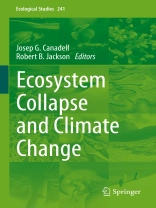Human-driven greenhouse emissions are increasing the velocity of climate change and the frequency and intensity of climate extremes far above historical levels. These changes, along with other human-perturbations, are setting the conditions for more rapid and abrupt ecosystem dynamics and collapse.
This book presents new evidence on the rapid emergence of ecosystem collapse in response to the progression of anthropogenic climate change dynamics that are expected to intensify as the climate continues to warm. Discussing implications for biodiversity conservation, the chapters provide examples of such dynamics globally covering polar and boreal ecosystems, temperate and semi-arid ecosystems, as well as tropical and temperate coastal ecosystems.
Given its scope, the volume appeals to scientists in the fields of general ecology, terrestrial and coastal ecology, climate change impacts, and biodiversity conservation.
Spis treści
Ecosystem Collapse and Climate Change: An Introduction.- PART I. Polar and Boreal Ecosystems .- Ecosystem Collapse on a Sub-Antarctic Island.- Permafrost Thaw in Northern Peatlands: Rapid Changes in Ecosystem and Landscape Functions.- Post-fire Recruitment Failure as a Driver of Forest to Non-forest Ecosystem Shifts in Boreal Regions.- A Paleo-perspective on Ecosystem Collapse in Boreal North America.- PART II. Temperate and Semi-arid Ecosystems .- The 2016 Tasmanian Wilderness Fires: Fire Regime Shifts and Climate Change in a Gondwanan Biogeographic Refugium.- Climate-Induced Global Forest Shifts due to Heatwave-Drought.- Extreme Events Trigger Terrestrial and Marine Ecosystem Collapses in the Southwestern USA and Southwestern Australia.- PART III. Tropical and Temperate Coastal Ecosystems.- Processes and Factors Driving Change in Mangrove Forests: An Evaluation Based on the Mass Dieback Event in Australia’s Gulf of Carpentaria.- Recurrent Mass-Bleaching and the Potential for Ecosystem Collapse on Australia’s Great Barrier Reef.- Sliding Toward the Collapse of Mediterranean Coastal Marine Rocky Ecosystems.- Marine Heatwave Drives Collapse of Kelp Forests in Western Australia.- Impact of Marine Heatwaves on Seagrass Ecosystems.
O autorze
Josep G. Canadell is a chief research scientist at the Climate Science Centre of the Australian Commonwealth Scientific and Industrial Research Organization, and the executive director of the Global Carbon Project, a global network of scientists that studies and integrates knowledge of greenhouses gases for human activities and the Earth System.
Rob Jackson is the Douglas Provostial Professor in Stanford’s Department of Earth System Science and Chair of the Global Carbon Project. Both scientists have spent decades documenting greenhouse gas emissions and how ecosystems are changing in response to climate and an altered atmosphere and environment.












